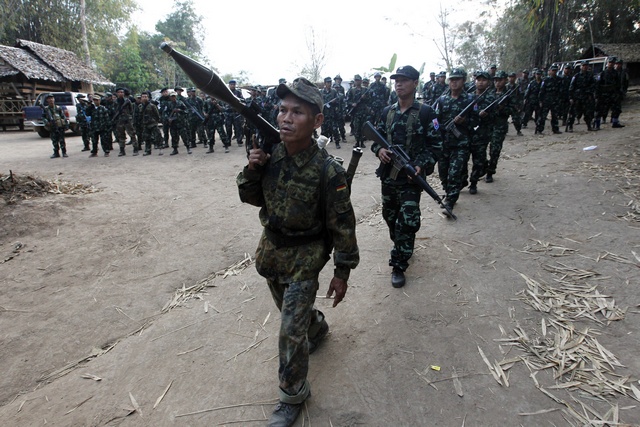The Border Consortium (TBC) released a statement on Thursday stating that there has been “no respite from militarisation” in southeastern Burma since 2011, when a number of ceasefires were signed with great fanfare between the Burmese government and armed ethnic groups.
TBC said that the increase in military presence in the region is being increasingly driven by resource extraction and commercial development.
TBC’s executive director, Sally Thomson, indicated that ongoing militarisation is one of several major factors hindering the repatriation of persons displaced by land confiscation, armed conflict and other security problems in southeast Burma.
“We have only seen small-scale and tentative return of refugees from Thailand, and [our latest report shows] that the overall number of internally displaced persons has not reduced significantly either. Efforts to prepare for the return and resettlement of displaced persons have been thwarted by ongoing militarisation and insecurity,” she said.
[related]
The TBC report, “Protection and Security Concerns in South East Burma,” goes into further detail about the increasing presence of Burmese government forces in the area and amalgamates the results of extensive surveys conducted across the region by TBC and its partner organisations. The report was released this week at TBC’s Annual General Meeting and Donors Forum.
TBC is an umbrella group of humanitarian relief NGOs that has been coordinating the provision of food, shelter and camp management support for refugees from Burma for 30 years.
NGOs and refugees alike have expressed concern in recent months about ration cuts at the camps due to declining financial support from donors.
But TBC’s partnership director, Duncan McArthur, said that his organisation had presented its preliminary budget for this year, and that it does not include any further ration cuts.
McArthur indicated that donors expressed positive signals about their willingness to continue funding TBC’s activities, largely because the international community is now more aware of the fact that Burma’s national reconciliation efforts and peace process have lost momentum.
“I think there is a general recognition amongst donors that the peace process is messy and complicated, and that there’s going to be a need for ongoing support—and flexible support so that we can respond either if return picks up … or if there is a push back,” he said.



